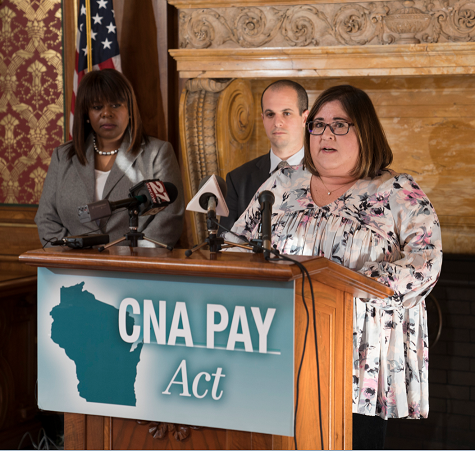Democrats Introduce CNA Pay Act alongside CNAs and Individuals Who Depend on Their Care
December 5, 2017
MADISON – Today, Representative Lisa Subeck (D-Madison), Representative Jonathan Brostoff (D-Milwaukee), and Senator LaToya Johnson (D-Milwaukee) officially introduced the CNA Pay Act. The three pieces of legislation would increase wages and expand access to training for Certified Nursing Assistants (CNA) working on the frontlines of long-term care and nursing facilities. The CNA Pay Act was circulated by Democrats after Assembly Republicans passed AB 432, which would diminish nursing care quality by reducing the required number of hours of training a CNA is required to complete. With 11,500 currently vacant personal care worker positions and demand for CNAs in Wisconsin projected to grow exponentially due to growth in the aging population, immediate action is needed to address the workforce shortage.
“Wisconsin faces a significant and growing shortage in personal care workers and nursing assistants, and the Republican answer has been to reduce training and depress wages putting the quality of care for Wisconsin’s most vulnerable residents in jeopardy,” said Rep. Subeck. “It is time that we pay these front line workers who provide care for our loved ones a living wage and treat them with the respect they deserve as professionals. Instead of continuing down the Republican path in a race to the bottom, our proposal would increase wages and make training more accessible and affordable.”
According to a joint report by the Wisconsin Health Care Association, Wisconsin Center for Assisted Living, Wisconsin Assisted Living Association, LeadingAge Wisconsin, and Residential Services Association of Wisconsin, the median starting wage for personal caregivers in Wisconsin is $10.75 per hour. The same report indicates that the median wage paid by non-health care employers for unskilled, entry level workers is $1.25 more than the wage paid to caregivers. The rate of CNAs leaving the profession continue to increase as they leave the industry for jobs with higher wages and better benefits.
“The work CNAs do is hard work, from bathing a patient to taking their pulse they are on the front lines to proving care,” said Sen. Johnson. “We want to ensure access to training making it easier for new CNAs to be certified.”
“CNAs in Wisconsin have a really hard job. If we expect them to take care of us, we need to take care of them,” said Rep. Brostoff. “They are vital members of our community doing incredibly impactful work. We ought to ensure they receive a wage that makes the expense of training worthwhile.”
LRB-4743 would create a tax credit for tuition costs for CNAs. After working for 1 year as a CNA, an individual can claim a one-time $1500 capped refundable tax credit for the cost of CNA training.
LRB-4744 would provide $500,000 annually to give grants to technical colleges in order to expand access to CNA training in underserved areas.
LRB-4745 would increase the Medicaid reimbursement rate for personal care services by accepting the Federal Medicaid expansion dollars. The bill requires that the reimbursement increase go directly to increasing wages of frontline caretakers.
Click here to read SEIU's support for the legislation.
Click here to read a fact sheet about the CNA Pay Act.




